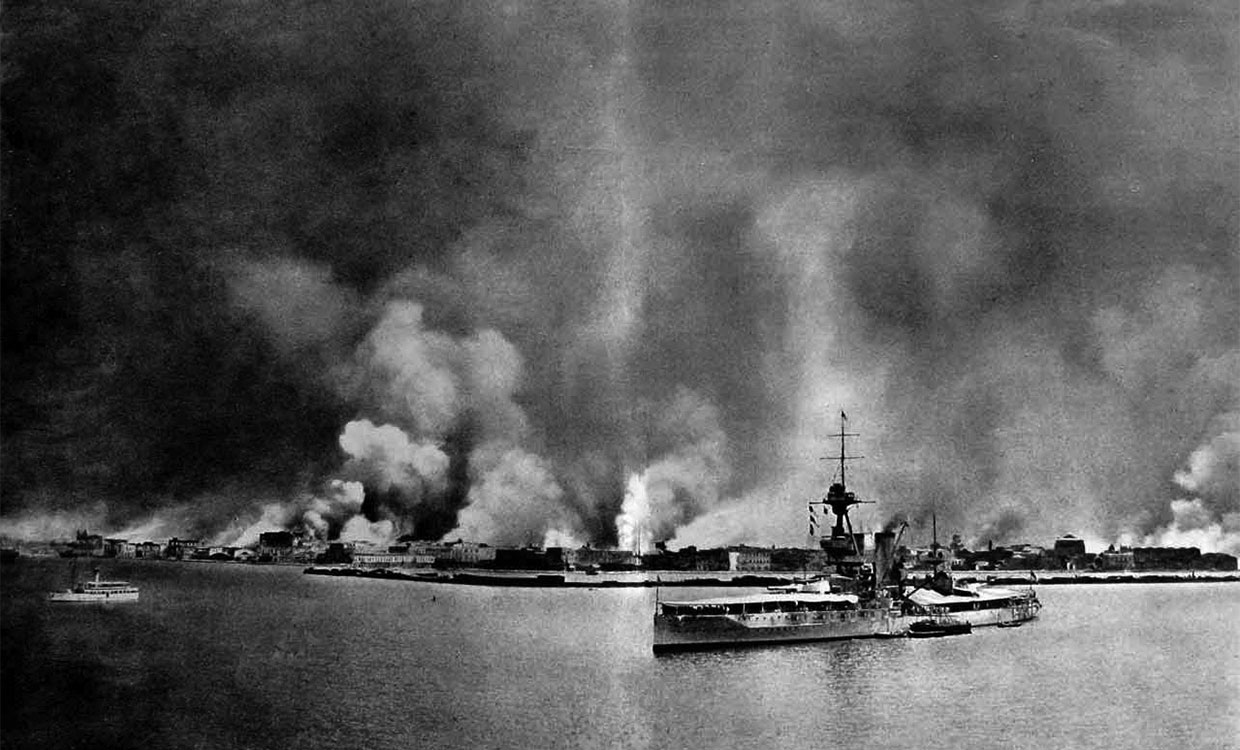General News
Meropi Kyriacou Honored as TNH Educator of the Year
NEW YORK – Meropi Kyriacou, the new Principal of The Cathedral School in Manhattan, was honored as The National Herald’s Educator of the Year.

A big part of the narrative surrounding the events of the burning of Smyrna one hundred years ago is that the Great Powers turned their backs on the Greek refugees. Indeed, their battleships were instructed to take on board only persons fleeing the fire who were their own citizens, as a way of maintaining misconceived neutrality in the conflict.
There are some accounts of how American naval personnel ignored the neutrality order and using small vessels smuggled bags of flour to Smyrna’s port and evacuated a few refugees on their return. Of course, the reason thousands of ethnic Greeks were stranded on the city’s waterfront was not directly attributable to the Great Powers. The Greek authorities had originally thought it best those Greeks should not leave or be evacuated the way the Greek army was, so as to lend demographic credence to any claims Greece might still make on Smyrna after the war. Some of those Greek leaders who made that fateful decision were later tried and executed for treason. Nonetheless, the unwillingness of the navies of the Great Powers to intervene is an example of the unwillingness of powerful countries to prevent crimes against humanity that was to be repeated in the twentieth century and more recently in the case of Syria.
Yet as far as America was concerned in 1922, this was not the end of the story. American officials and citizens more than made up for their government’s indecisions. Some of their stories have become better known over the recent years. That of George Horton the United States Consul in Smyrna is the best known. A philhellene who was married to a Greek, Horton was present during the destruction of Smyrna and did a great deal to protect the Christian population. He described those events in a searing and emotional account, The Blight of Asia, published in 1926.
Another story now gaining some deserved publicity is the extraordinary feat of Asa Jennings, a YMCA employee in Smyrna who was part of a group of American residents in Smyrna who organized a safe haven for Christian women and children when the city fell to the Turks. In what was an unlikely turn of events, Jennings, with the help of Naval officer Halsley Powell, engineered the evacuation of the over 250,000 refugees who remained stranded on Smyrna’s waterfront after the fire consumed the Armenian and Greek neighborhoods. The refugees were taken across the Aegean to the island of Mytilene aboard Greek transport ships which had taken the Greek troops from Asia Minor to that island and remained anchored there. It was a bold plan devised and executed by Jennings, backed up militarily by Powell and approved and encouraged by Greek admiral Ioannis Theophanides.
A lesser-known story is the enormous contribution of the members of the American Women’s Hospitals (AWH) organization who offered lifesaving care to the refugees who arrived in Greece. Dr. Esther Pohl Lovejoy, the chair of the AWH, arrived in Smyrna days after the fire and was a witness to the dramatic evacuation of the refugees on the ships Jennings had brought from Mytilene. The AWH had been formed to provide medical assistance to Americans fighting in WWI. The organization was not disbanded at the end of the war because its leaders were well aware of the suffering of thousands of civilians in its aftermath. As Lovejoy said, in some countries the aftermath of the war was far worse than the war itself.
Fearing the spread of disease, the Greek authorities ordered vessels bringing refugees to Piraeus to instead drop of them on the barren island of Macronisos, off the eastern coast of Attica. There, they were housed in rudimentary outdoor camps. The AWH swiftly established services on the island. Three AWH women doctors, two nurses, and assistants recruited from among the refugees, cared for over ten-thousand people suffering from diseases such as lice, typhus, and smallpox.
The AWH was not the only American agency helping the refugees. The American Red Cross had already established itself in Greece in 1918 and remained active through 1923. By then, another American organization, Near East Relief, assumed the role of rehabilitating and settling the hundreds of refugees and continued its efforts for another decade. And finally, perhaps the most substantive and symbolic sign of America’s post-1922 involvement in Greece was the international Refugee Settlement Commission that coordinated all refugee related work in Greece. It was headed by an American, the businessman and diplomat Henry Morgenthau Sr.
During last year’s bicentennial of the Greek revolution of 1821, we heard a lot about the contribution of American philhellenes. There is also a story to be told about American philhellenism in the 1920s as we mark the centenary of the Asia Minor Disaster.
NEW YORK – Meropi Kyriacou, the new Principal of The Cathedral School in Manhattan, was honored as The National Herald’s Educator of the Year.

MELBOURNE, Australia (AP) — More than 100 long-finned pilot whales that beached on the western Australian coast Thursday have returned to sea, while 29 died on the shore, officials said.
KYIV, Ukraine (AP) — Russia launched a barrage of missiles against Ukraine overnight, in attacks that appeared to target the country’s energy infrastructure.
MADRID (AP) — Top-ranked Iga Swiatek eased into the Madrid Open’s round-of-16 by beating Sorana Cirstea 6-1, 6-1 on Saturday.
NEW YORK (AP) — Donald Trump says he wants to hold a major campaign event at New York’s Madison Square Garden featuring Black hip-hop artists and athletes.
Following her compelling travel memoir, Unpacking for Greece: Travel in a Land of Fortresses, Fables, Ferries and Feta, the first in the series, author Sally Jane Smith continues her charming journey in the recently released second book, Repacking for Greece: A Mediterranean Odyssey.